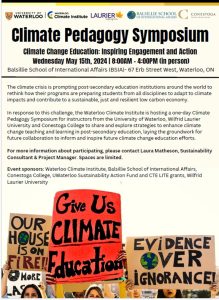Professional Development Plan
I have chosen the Climate Pedagogy Symposium, Climate Change Education; Inspiring Engagement and Action (May 15th, 2024; see the poster on page four) for a professional development activity. The activities will aid in expanding my learning related to infusing and incorporating sustainability education into the courses for which I am the faculty providing curriculum guidance. It will provide:
- learning how to communicate complex climate science concepts engagingly and effectively.
- encourage critical thinking and problem-solving related to real-world climate issues.
- make connections with faculty from other institutions facing the same challenges.
The session is being promoted at Conestoga College as part of our journey to building our capacity as a signatory of Principles for Responsible Education Management (PRME) and our membership in the Association for the Advancement of Sustainability in Higher Education (AASHE). Both are guiding the College School of Business in planning how we approach teaching positive outcomes in education related to sustainability, climate action, and the Sustainable Development Goals (SDGs), preparing students as future leaders in the business world.
The session was on our college website and promoted through our PRME working group. This supports a presentation I will be giving as part of building a sustainability curriculum during the college-wide Employees for Excellence in Education Conference (E3) on May 29th. My presentation topic is Building Sustainability Curriculum: The Piedmont/Ponderosa Model, Stories from the Frontline. I am excited that I was able to connect with Dr. Geoff Chase to co-present with me.
 Keywords that might be used in a search include climate pedagogy, climate education activities, environmental teaching resources, or innovation in climate teaching.
Keywords that might be used in a search include climate pedagogy, climate education activities, environmental teaching resources, or innovation in climate teaching.
Other activities I have participated in include our recent PRME Showcase Conference on May 8th and several education opportunities offered through the PRME i5 playbook and UN Global Compact (May 9th on transition justice), which I have recently attended. My approach is to absorb as much information as possible to keep a holistic and broad view of climate change, sustainability, and curriculum development.
My learning outcomes from this activity and others include:
- learn how to help students understand climate science concepts effectively,
- how to engage students in the discussion,
- how to influence students’ attitudes and behaviours towards the environment,
- make connections for future collaborations.
- expand my learning journey as an educator!
The learning and outcomes can also be linked to the six historical thinking concepts that we will explore in our course PME811:
- Significance helps us discern what is important from the historical information.
- Continuity and Change allow us to understand the complex flows of history and the factors driving change and continuity.
- Cause and Consequence help us understand why certain events occurred and their impact.
- Ethics enables us to judge our actions from the past and develop informed opinions for the future.
- Evidence is the grounding of history in facts that allows us to ask critical questions about our sources of information.
- Perspective encourages us to empathize with diverse viewpoints and be open to understanding the context that shaped other people’s beliefs and actions.
Professional development fosters a culture of curiosity and innovation, driving me to consistently acquire new skills and knowledge and increase adaptability in the face of changing global world and technological advancements. Ultimately, the pursuit of lifelong learning is rewarding.


